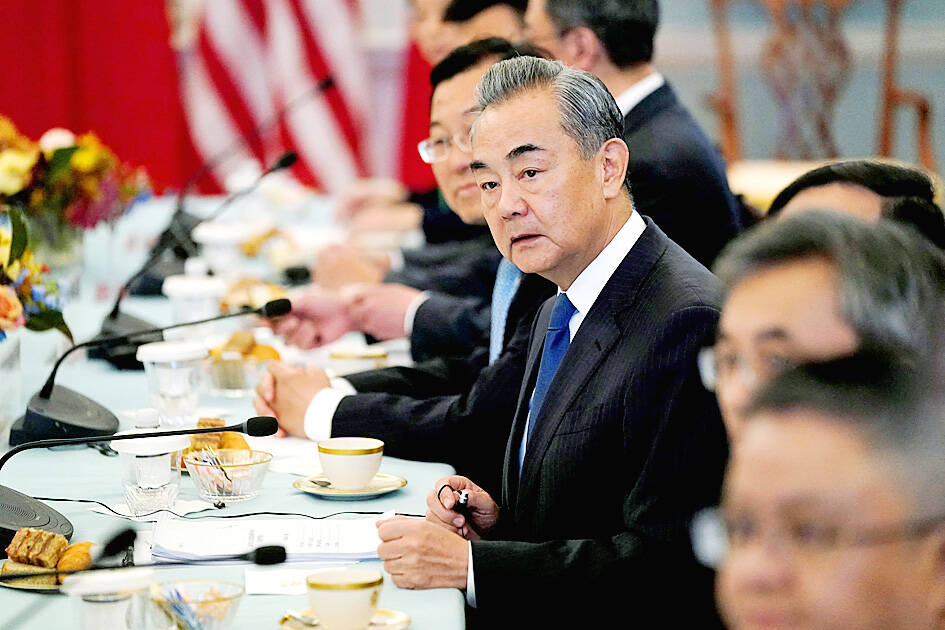The US and China on Friday agreed to work toward setting up a meeting between the two countries’ leaders next month, after US President Joe Biden met Beijing’s top diplomat at the White House.
Biden has invited Chinese President Xi Jinping (習近平) to San Francisco next month for the APEC summit at a time of tense relations between the two powers. Xi has not yet confirmed he would attend.
After Chinese Minister of Foreign Affairs Wang Yi (王毅) held talks with Biden and other senior US officials in Washington, the White House said that both countries had agreed to keep up “high-level diplomacy” to try to smooth ties.

Photo: Reuters
The two sides “reaffirmed” that they were “working together towards a meeting between President Biden and President Xi Jinping in San Francisco in November,” the White House said in a statement.
A senior administration official said the White House was leaving it to Beijing to confirm that Xi would come, but “we are making preparations for just such a meeting.”
An official readout of talks between Wang and US National Security Adviser Jake Sullivan released by Beijing confirmed “both sides agreed to make joint efforts to realize a meeting between the two heads of state.”
In a separate readout of his meeting with Biden, Wang was quoted as saying that his visit was aimed at “working to stop the decline in China-US relations, stabilize them, and bring them back to the track of sound and steady development.”
Biden told Wang that Washington and Beijing must “manage competition in the relationship responsibly and maintain open lines of communication,” the White House said in a statement.
Wang has been on a two-day visit to Washington during which he also met with US Secretary of State Antony Blinken.
After meeting with Blinken on Thursday, Wang acknowledged that differences would still come up, but said China would respond “calmly.”
Biden and Xi have had no contact since a meeting in Bali, Indonesia, in November last year. Relations have been tense for years between the world’s top two economies as they vie for influence in the Asia-Pacific region and beyond, and as Beijing boosts cooperation with Russia in a bid to reduce US dominance.
A particular point of contention has been Taiwan.
“The biggest threat to peace and stability in the Taiwan Strait is ‘Taiwan independence,’ and the biggest challenge to China-US relations is also ‘Taiwan independence,’ which must be resolutely opposed,” Wang said in the readout of his meeting with Sullivan.
In his meeting with Biden, he also stressed the centrality of the “one China” principle to US-China ties, according to the readout.
A senior US government official, speaking on condition of anonymity, quoted Blinken as telling Wang that the US opposes any unilateral changes to the “status quo” in the Taiwan Strait, and that the US would work to maintain peace and stability in the Strait.
Additional reporting by staff writer

A car bomb killed a senior Russian general in southern Moscow yesterday morning, the latest high-profile army figure to be blown up in a blast that came just hours after Russian and Ukrainian delegates held separate talks in Miami on a plan to end the war. Kyiv has not commented on the incident, but Russian investigators said they were probing whether the blast was “linked” to “Ukrainian special forces.” The attack was similar to other assassinations of generals and pro-war figures that have either been claimed, or are widely believed to have been orchestrated, by Ukraine. Russian Lieutenant General Fanil Sarvarov, 56, head

SAFETY FIRST: Double the number of police were deployed at the Taipei Marathon, while other cities released plans to bolster public event safety Authorities across Taiwan have stepped up security measures ahead of Christmas and New Year events, following a knife and smoke bomb attack in Taipei on Friday that left four people dead and 11 injured. In a bid to prevent potential copycat incidents, police deployments have been expanded for large gatherings, transport hubs, and other crowded public spaces, according to official statements from police and city authorities. Taipei Mayor Chiang Wan-an (蔣萬安) said the city has “comprehensively raised security readiness” in crowded areas, increased police deployments with armed officers, and intensified patrols during weekends and nighttime hours. For large-scale events, security checkpoints and explosives

PUBLIC SAFETY: The premier said that security would be tightened in transport hubs, while President Lai commended the public for their bravery The government is to deploy more police, including rapid response units, in crowded public areas to ensure a swift response to any threats, President William Lai (賴清德) said yesterday after a knife attack killed three people and injured 11 in Taipei the previous day. Lai made the remarks following a briefing by the National Police Agency on the progress of the investigation, saying that the attack underscored the importance of cooperation in public security between the central and local governments. The attack unfolded in the early evening on Friday around Taipei Main Station’s M7 exit and later near the Taipei MRT’s Zhongshan

REBUFFED: In response to Chinese criticism over recent arms sales, Washington urged Beijing to engage in meaningful dialogue instead of threats and intimidation Washington’s long-term commitment to Taiwan would not change, the US Department of State said yesterday, urging Beijing to stop pressuring Taiwan and engage in meaningful bilateral dialogues. The remarks came in response to a backlash from Beijing about Washington’s latest approval of arms sales to Taiwan. The US Defense Security Cooperation Agency said in a statement on Wednesday that the Taipei Economic and Cultural Representative Office in the US has asked to purchase an arms package, including Tactical Mission Network Software; AH-1W helicopter spare and repair parts; M109A7 self-propelled howitzers; HIMARS long range precision strike systems; tube-launched, optically tracked, wire-guided missiles; Javelin